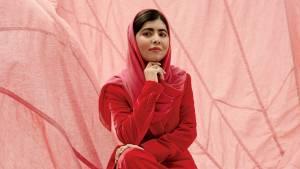Journalist and documentarian
Sharmeen Obaid Chinoy (born 1978), is an Emmy and Oscar award-winning Pakistani-Canadian journalist and documentary filmmaker. She won an Emmy for her documentary, Pakistan: Children of the Taliban in 2010. She is also the first non-American to win the Livingston Award for Young Journalists. On 26 February 2012 Sharmeen Obaid Chinoy won an Oscar for her documentary film, Saving Face. She has been lauded as Pakistan’s first Oscar winner by the press and government.
Early Life
Born in Karachi as Sharmeen Obaid, she was the first woman in her family to receive a Western education. Sharmeen graduated from Smith College with a bachelor of arts in economics and government and then went to complete two master’s degrees from Stanford University in International Policy Studies and Communication. Obaid’s career in documentary filmmaking began when she examined the plight of Afghani refugee children in Pakistan for one of her articles. Their situation was so dire, and their stories so compelling, that Sharmeen decided to return to Pakistan and create a film about them. She petitioned Smith College and New York Times Television production division for the grants that would allow her to accomplish her goals.Intrigued by her story, both organizations gave her the funds as well as production equipment and training.
Career
Obaid-Chinoy’s career in documentary filmmaking began when she examined the plight of Afghan refugee children in Pakistan for an articles. Their situation was so dire, and their stories so compelling, that Obaid-Chinoy decided to return to Pakistan and create a film about them. She petitioned Smith College and New York Times Television production division for the grants that would allow her to accomplish her goals. Intrigued by her story, both organizations gave her the funds as well as production equipment and training.
Obaid-Chinoy is currently a faculty member in the media sciences department at SZABIST (Shaheed Zulfiqar Ali Bhutto Institute of Science and technology, Karachi). Obaid-Chinoy is also on the board of The Citizens Archive of Pakistan (CAP).
Career as a Documentarian
Known for documentaries dealing with life in the Muslim world, Obaid-Chinoy became the first non-American to win the Livingston Award. Her films have aired on such networks as Channel 4, CNN, PBS,HBO and Al-Jazeera.
Obaid began her career with New York Times Television in 2002 where she produced Terror’s Children, a film about Afghan refugee children, which won her the Overseas Press Club Award, the American Women and Radio and Television Award, and the South Asian Journalist Association Award. Since then, she has produced and reported on more than twelve films around the world.
Obaid produced and reported on four multi-award winning documentary films for New York Times Television. In 2003, Reinventing the Taliban was awarded the Special Jury Award at the BANFF TV festival in Canada, the CINE Golden Eagle Award, the American Women in Radio and Television award, and the Livingston Award. In 2005, her film Women of the Holy Kingdom, which provided an inside look at the women’s movement in Saudi Arabia, won the South Asian Journalist Association Award.
In 2005, Obaid began working with Channel 4 in the United Kingdom reporting on four films for their Unreported World series. Pakistan’s Double Game looked at sectarian violence in Pakistan, City of Guilt explored the Catholic Church’s pro-life movement in the Philippines, The New Apartheid looked into growing xenophobia in South Africa, and Birth of a Nation delved into the politics of East Timor. In 2007, Obaid was named “journalist of the year” by the One World Media awards for her work in the series.
In 2007, Obaid travelled to Afghanistan and reported for Channel 4 and CNN. Her film, Afghanistan Unveiled/Lifting the Veil, focuses on stalled reconstruction and the repression of women in the country.
In 2010, she won an Emmy Award for her documentary, Pakistan: Children of the Taliban, which explores Taliban recruitment strategies, their effect on the youth and their methods to radicalize the country’s young and often dejected populace. Children of the Taliban premiered FiLums (2011) – the largest film festival in Pakistan held annually at the Lahore University of Management Sciences.
On February 26, 2012, Obaid became the first Pakistani to win an Oscar for her documentary Saving Face, which chronicles the lives of acid attack survivors in Pakistan, and follows a British-Pakistani plastic surgeon Mr. Mohammad Ali Jawad, who performs reconstructive surgeries on them. The film has been co-directed by American filmmaker Daniel Junge.
This interview with Sharmeen Obaid Chinoy took place before she was nominated for an Oscar for her documentary Saving Face.
She won the Emmy Award for her documentary Pakistan’s Taliban Generation last year and if that wasn’t proof enough of her amazing track record, she has now been shortlisted for an Academy Award nomination for her documentary Saving Face. Documentary filmmaker Sharmeen Obaid Chinoy is both “excited but nervous at the same time” about being shortlisted, “but it’s not a nomination as yet!” she clarifies. The announcement of the final nominations will be made on January 24 and we keep our fingers crossed as Sharmeen begins to reveal more about the documentary in her characteristic passionate tones.
Saving Face follows the story of a British Pakistani plastic surgeon, Dr Mohammad Jawad, as he reconstructs the faces of two women in Pakistan, victims of acid attacks. Sharmeen, along with Daniel Jung, filmed the documentary entirely in Pakistan. It includes references to the passage of a bill aimed at preventing acid attacks in the future. Sharmeen explains: “I wanted to tell a positive story of a situation where justice was served.” Saving Face is set to air on America’s cable television network HBO in March 2012.
Determined to make it into the field of journalism, Sharmeen, who wrote her first article for Dawn at age 14, began freelancing for American and Canadian newspapers while studying at Smith College in the US. Alongside, she worked as an international documentary producer and correspondent for New York Times television. She has also been a reporter and director for some reputable international television channels such as PBS and Al Jazeera International.
Sharmeen moved back to Pakistan in 2007 and, since then, has been channelling her efforts into giving back to society. She is the co-founder of a non-profit organisation, The Citizen’s Archive of Pakistan (CAP) aimed at preserving Pakistan’s rich cultural and historical heritage.“We realised that there was no active conversation between the country and its people about who we are. We thought since we’ve still got the first generations of Pakistanis amongst us who could share tales of the journey that they made, we should take this opportunity to record their accounts of our history. Soon after we embarked on the project, it became clear to us that this was the only history project of this magnitude and of this nature in the entire country.”
Sharmeen Obaid-Chinoy Pictures
|
|
|
| ||||||||
|
|
|
| ||||||||
|
















